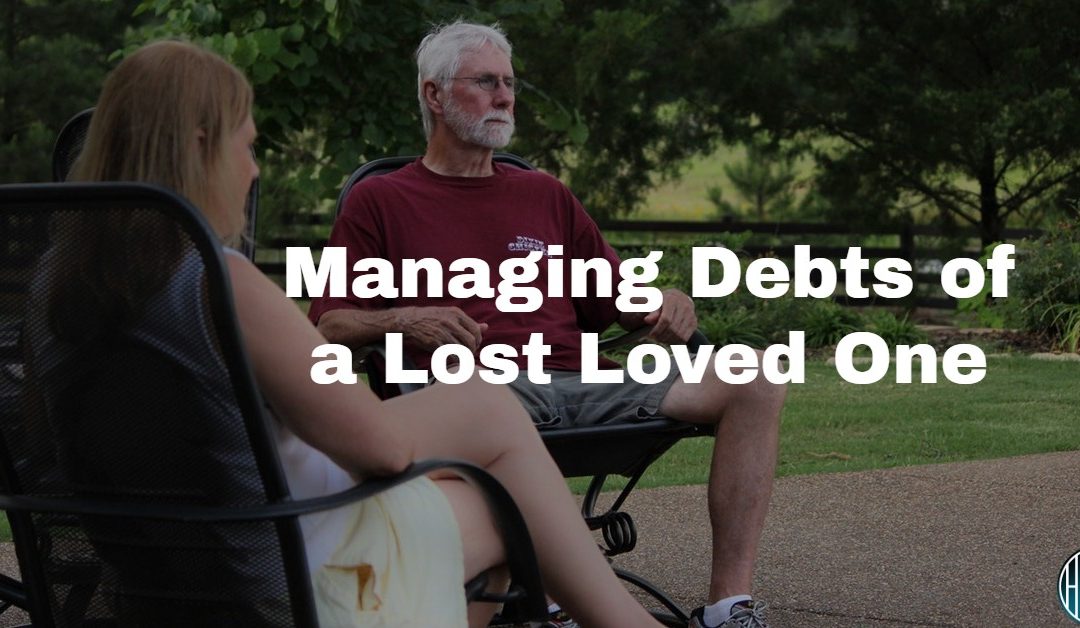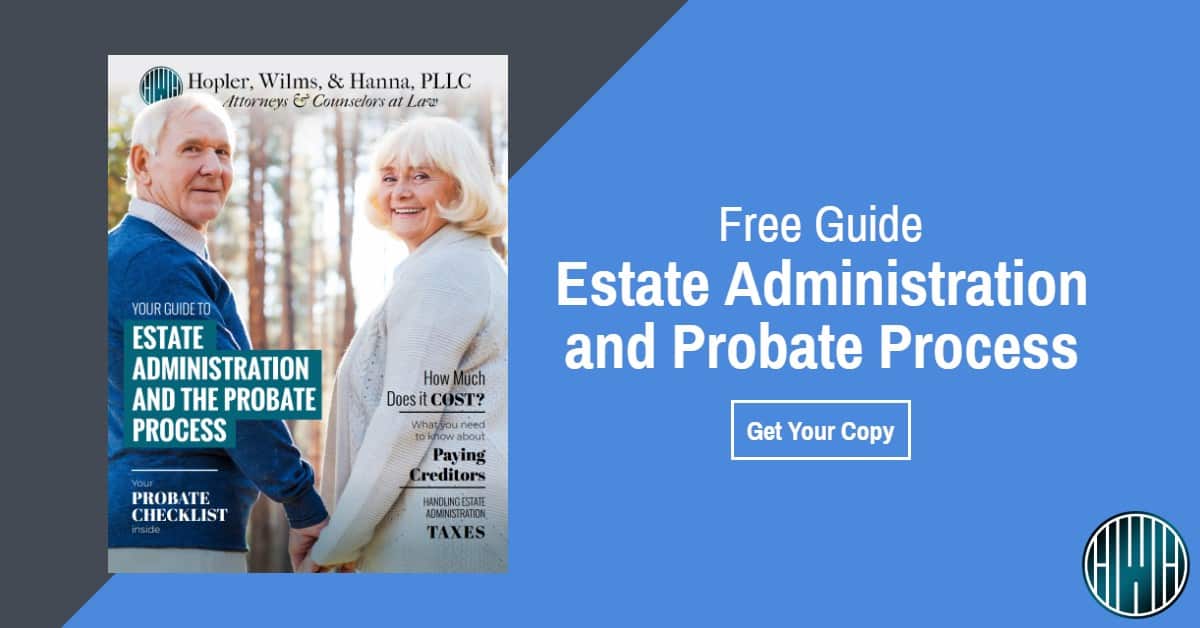The death of a loved one is never easy, not in the least, because of relentless creditors who continuously call or mail about overdue bills belong to the deceased person. When you are trying to handle the grief of losing a loved one, the last thing you want to deal with is a pushy debt collector.
In What Order Do I Need To Pay The Bills?
When people die, they often leave behind debts. This may include mortgages, car payments, funeral payments, medical debt, credit card debt, or so on. Losing someone you love is hard enough, but when you have to figure out their finances it might feel like you are facing an impossible task.
Rest assured, creditor claims are manageable. North Carolina has laws in place about how to handle claims and our attorneys at Hopler, Wilms, & Hanna are also experienced in helping people get through this process and deal with debt collectors.
Not all creditor claims are created equal.

While it may seem like you should go ahead and pay after getting the third notice from a collection company like DCM Services, Ascension Point, or Phillips & Cohen, there is a certain order to pay creditor claims and you should not let these companies lead you to believe their claims are more important than other claims, which by law may have a higher priority:
- First Class Claims: A first-class claim would be a lien on your loved one’s property up to the value of the property. If the lien is worth more than the property, the remainder of the claim would become a lower priority claim, usually a ninth class claim.
- Example: Your loved one had a car worth $17,000.00 and has a $20,000.00 lien on it. The $17,000.00 would be a first-class claim and the remainder ($3,000.00) would become a ninth-class claim. Practically, this means that if you did not have enough money to pay for everything, the $17,000 would be paid long before you considered whether to pay the $3,000.
- Second Class Claims: A second class claim is the first $3,500.00 of funeral expenses. Anything over $3,500.00 would become a ninth class claim.
- Example: Your family goes to a funeral home and arranges a nice funeral for your loved one. The funeral costs $6,000.00. The first $3,500.00 is a second class claim and the remainder ($2,500.00) would become a ninth class claim.
- Third Class Claims: A third class claim is the first $1,500.00 of a gravestone and burial site. Anything over $1,500.00 would become a ninth class claim.
- Example: Your family chooses a gravestone and burial plot in a cemetery for your deceased loved one that costs $2,000.00. The first $1,500.00 of that is a third class claim. The remainder ($500.00) would become a ninth class claim.
- Fourth Class Claims: A fourth class claim would be any federal taxes or other federal claims.
- Example: Your loved one owed $500.00 on their federal tax returns. That $500 is a fourth-class claim. As scary as the IRS or the NC Department of Revenue may be, they do not come first when it comes to the payment of debts of a deceased person.
- Fifth Class Claims: A fifth class claim would be any North Carolina state or local taxes.
- Example: Your loved one owed $500.00 on their state tax return. That $500.00 is a fifth-class claim. Personal property taxes from local governments would also fall into this category.
- Sixth Class Claims: A sixth class claim would be any judgment against your loved one and anything owed to the Department of Health and Human Services.
- Example: Your loved one lost a lawsuit and has been ordered to pay $10,000.00 to the other party. That $10,000.00 is a sixth class claim.
- Example: Your loved one was on Medicaid. Any Medicaid bills would be a sixth-class claim. There are special rules if you have both judgments and Medicaid debt at the same time, though, so be careful with this one.
- Seventh Class Claims: Seventh class claims are wages owed to employees of your loved one for up to twelve months prior to their death, medical services up to twelve months prior to their death, and the costs of medical supplies and drugs used in treatment during the last twelve months before their death.
- Example: Your loved one hired an employee to provide in-home care before they died. The employee needs to collect their paycheck from before your loved one passed away. The wages would be a seventh class claim.
- Example: Your loved one was in the hospital for six months before they died. Any hospital bills they had would be a seventh class claim as well as any bills for their treatment.
- Eighth Class Claims: Eighth class claims are claims for equitable distribution, or for if your loved one dies while in the middle of a divorce. In that case, their ex-spouse can continue the process to get their share of the equitable distribution.
- Ninth Class Claims: Nearly everything else! Most claims fall into this category. Examples of ninth class claims include:
- Living expenses
- Credit card debt
- Other medical bills, such as if a loved one has been in the hospital or receiving medical services for over a year
Very often, it is creditors in the ninth class who employ debt collection agencies like DCM Services or Ascension Point. However, as you have seen above, there is a certain order that debts must be paid according to the state of North Carolina. DCM, Ascension Point, Phillips & Cohen, and other faceless corporations need to wait in line, no matter how many letters they send or phone calls they make.
I Know The Order To Pay, Now What?
Now that you have a basic idea of the order creditor claims are to be paid, you are probably wondering how to find out who the creditors are. Just like the order of creditors to pay, North Carolina has laws and statutes that tell you how to notify creditors and what counts as a valid claim.

Once you are granted Letters of Administration after opening an estate, the next step is to notify any potential creditors that they need to send in a claim.
The required way of doing this is by putting a notice in the local newspaper of the county where your loved one lived. The notice must be published once a week for four weeks in a row and it has to provide a mailing address where creditors can send their claims.
If the county doesn’t have a newspaper, then there are additional steps that must be followed. If that situation happens to you, Hopler, Wilms, & Hanna will be happy to go over your other options and walk you through the process. Here is an example of what a Notice to Creditors might look like in the newspaper:
NOTICE TO CREDITORS: All persons, firms or corporations having claims against Jane Doe, deceased, of Durham County, North Carolina, are notified to exhibit the same to the undersigned on or before October 1, 2019 or this Notice will be pleaded in bar of recovery. Debtors of the decedent are asked to make immediate payment. This the 1st day of July, 2019. John Doe, Executor, c/o Hopler, Wilms, & Hanna, 2216 S. Miami Blvd., Ste. 101, Durham, NC 27713, Dates of Publication: 7-1, 8, 15, 22, 2019.
Note that the newspaper will give you an Affidavit of Publication, which says that they did publish the notice on the correct dates and that they are an appropriate newspaper for that type of notice. When you file the Inventory for the estate, you will usually also file the Affidavit of Publication.
Creditors then have three months from the date the first notice is published to submit claims to the estate. However, if you already know about debt or could with due diligence discover a debt in the first 75 days of your appointment as the Executor or Administrator, or even suspect there might be debt, you should mail a notice of creditors to them directly.
For example, if you know your loved one was in the hospital at the end of their life and that they would have unpaid medical bills, you should send a notice to the hospital since you already know about the money owed to them. Keep in mind that when you mail these notices, there are different rules about the deadlines those creditors get to file a claim, particularly if you learn about them after you put the notice in the newspaper.
Much of this gets complicated by insurance payments or again figuring out what class of claim it would fall under. It can also feel more complicated when the creditors begin sending collection companies after you.
Even though there is a process that is supposed to be followed, collection companies like DCM or Ascension Point can make it sound like you, personally, will get in trouble for not paying them even though they often quickly read a disclaimer at the beginning of the call indicating you are not personally responsible for the debt.
Remember, these companies are not authorities on the laws. They only serve one purpose which is to collect money. Sometimes they will ask you to provide documentation or information which they could easily find in the court file themselves.
Keep in mind that it is not your responsibility to do their homework. Your responsibilities are limited, and a good probate attorney will help you do what you need to do to make sure your responsibilities are met, but that you are not expending labor, time, or money doing more than the law requires of you, particularly while you are grieving and dealing with the litany of other matters requiring your attention.
The claims they present might not even be valid or you might not have to accept the total amount due. However, their goal is to get paid, even if it’s not in the right order or even if the estate doesn’t have enough money to pay all the claims.
How Do I Know What Claims To Pay?
For a creditor claim to be considered valid, it must meet the following criteria:
- The claim must be in writing
- The claim must state the amount of debt
- The claim must include the name and address of the creditor
- The claim must be presented by personal delivery, via mail, or filed with the Court
However, just because a claim meets all of these criteria doesn’t mean you should accept every claim as it’s written. If you don’t agree with the claim or there is not enough money in the estate, you may be able to reject the claim or settle it for a lesser amount. DCM, Ascension Point, Phillips & Cohen, and other collection agencies may be willing to work with you, but it is always good to have an attorney who has dealt with these agencies before to negotiate their claims or outright reject them for you.
What Should I Do About Contested Claims?
If you do not agree with a creditor claim, you are able to contest it or potentially reject it. Some reasons you may be able to reject a claim include:
- The claim was submitted late – remember, you put out a notice to creditors in the newspaper and mailed a notice to creditors you knew about. They have about three months to then submit a claim. If they submit a claim after the three months, even if it meets all of the criteria mentioned above, you may be able to reject it.
- The claim does not meet all of the criteria mentioned above – for example, you get a letter in the mail stating that your loved one owes money, but it does not tell you how much money is owed. You may be able to contest or reject this claim because it does not include the amount of debt. However, if you’ve ever dealt with collection companies, this may not be an option if you’re dealing with claims presented by companies such as Phillips & Cohen who usually send out a form letter with all the important details in it.
If you do want to reject a claim, you must do so in writing to the address provided by the creditor. You can also reject part of a claim if you think part of it is valid but not all of it, you would just need to make that known in your rejection.
Once you send the rejection, creditors have three months to respond before they can’t come after the debt again. Creditors may be willing to settle for part of the debt and may be willing to negotiate with you or your attorney to accept a percentage of the debt owed.
For example, if your loved one owed $1,000.00 on their credit card bill, you may be able to negotiate with DCM or Ascension Point to pay only 75% of the debt, meaning you would only have to pay $750.00. This process can be timely though, as the agents you speak to may need to confirm with managers and they may push you to pay more than you want to pay.
They may also push you to settle quickly with their first offer, even if there is a lot of time left to settle. For example, when negotiating the $1,000.000 owed to the credit card company, you may offer to pay 50% but the credit card company may come back and say you need to pay 90%.
They may tell you this is their final offer, even though there is still a lot of time left to negotiate. This is when it is good to have an attorney who has experience with creditors because we know their tactics and make sure you get a fair settlement.
If a creditor does agree to a settlement, they will send a letter saying so and which says they will release their claim once payment is made by a certain date. You also have the option of taking the debt to a type of arbitration where a neutral third party determines if the debt is valid and what, if any, portion the estate needs to pay.
Regardless of if you believe a claim is valid or not, or if you want to fight it or just go ahead and pay it, make sure to remember that you, personally, are not responsible for the debts in the vast majority of cases.
These are debts the estate owes. Creditors may make you feel like you should pay them from your own accounts by putting pressure on you or trying to set up a payment plan. Even if your loved one named you as executor in their will and even if there is not enough money in the estate to pay all the debts, you are still not personally responsible for them.
Collection companies get paid to collect debts and may seem to toe the line as long as they get some form of payment.
Relentless creditors can make an already trying situation much more difficult and stressful with their repeated calls and letters. Remember, as long as you follow the laws and statutes we discussed above, creditors must wait their turn to be paid from the estate and you have the option to negotiate with them instead of just paying the full amount.
If you find this process daunting, rest assured that the attorneys at Hopler, Wilms, & Hanna deal with creditors on a daily basis. We would love to set up a consult with you to discuss your loved one’s estate and the bills you may already be receiving.
You should be able to mourn your loved one in peace without having to worry about all these details as well. Please feel free to call or email us today to get an appointment so we can give you more specific advice for your loved one’s estate.


